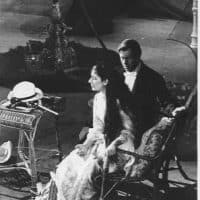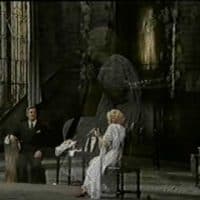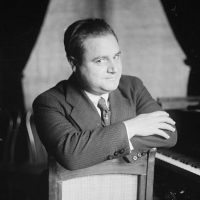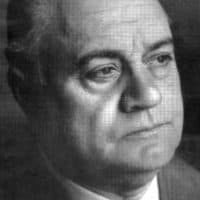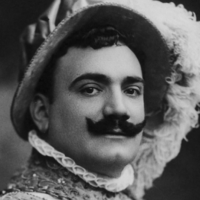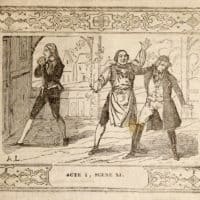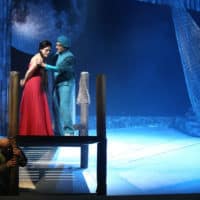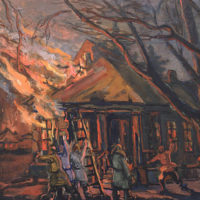
Soprano Angel Joy Blue is singing the role of the young slave girl Liù in the San Diego Opera production of Turandot on February 24 and 27, and March 2 and 4, 2018. Lise Lindstrom sings the title role of Turandot and Carl Tanner sings Calàf. Keturah Stickann directs the production. Valerio Galli is the conductor. I sat down with Angel last week to talk about some of the things that have influenced her career and the roles she dreams about in the future.
Eva: This is your debut in Turandot. Is an opera debut something that you can just take in stride or is it different from performing a role that you’ve sung before?
Angel Joy Blue: I take it in stride but I also relish the fact that because it’s new and the piece is fresh I get to work on it more and more. I’ve done a lot of work even before we started the first rehearsal so I feel very well prepared for the role.
There’s something to be said for singing a role for many years because there are things we will be comfortable with if we’ve sung it a lot. I’ve sung Mimi 52 times and I’ve sung Musetta 48 times and Michaela 27 times I believe. This will be my first time singing Liù. The difference for me is the comfort level. Singing something that’s new usually requires – and this might sound bad – more thinking, because I have to make sure to remember the phrasing for one section and the breathing for another section. Whereas if I’m singing Mimi, or La Traviata, my body just knows what to do in the different sections. It’s not that I’m not paying attention but sometimes I can be on auto-pilot.
I’m doing another Mimi coming up in a couple of months. I’ve sung the role so many times. A part of me feels why do I need to keep doing it. I need to find other things. I’m like one of those kids that you have to keep interested all the time so they don’t lose their focus. It’s nice to have something new like this. It’s not a demanding role vocally and acting it is actually harder than singing it.
It’s also helpful to have a director like Keturah Stickann who’s so involved in the details. I like details. I need structure. I hope I get to work with her a lot more.
Eva: You were a finalist in Operalia in 2009 and received 1st place in the Zarzuela competition and 2nd place in the opera competition. Following that, you performed several times with Placido Domingo. How does it influence your singing when you perform with an opera legend of that caliber? What have you learned from him?
Angel Joy Blue: Maestro Domingo is amazing. He sets the bar very high for anyone who works with him. On a scale of 1 to 10, Maestro Domingo always comes in at a 10, or higher. The biggest thing that Maestro Domingo has done for me artistically and as a human being is that he raises the bar, and he keeps it high. Everyone around him wants to do their best. That’s a true testament to a great artist and a great person.
I had a concert with him in Budapest in 2016 with 11, 600 people there in an arena. Outside there were two huge screens. I was standing backstage listening to him sing his encore, Besa Me Mucho. He was like a rock star to me and the passion he had behind the singing was really contagious. I had to sing my encore after. I was worried because I only got there three days before and I was tired but the way he sang was so great and so contagious that by the time I stood on the stage, I could feel that energy from him jumping off on to me.
I’ve had many conversations with him about how to preserve one’s voice, how to keep training, the process in learning different music, heavier music even, but I always find that his passion and excitement for the art form of singing is infectious.
Eva: Are there other singers performing now who you would like to sing with and why?
Angel Joy Blue: There are so many. I adore Renee Fleming. I read Renee’s autobiography, The Inner Voice, when I was getting my graduate degree at UCLA. She had to overcome so many things before she became the people’s diva. To me she’s the great American soprano – she’s done the Super Bowl, she’s been on David Letterman, and she’s done crossover work. She is not an opera snob who would turn her nose up to other things. I respect that greatly. In opera, we need people who can branch out and reach out to people in many different ways. She’s done that brilliantly. Her career has been truly second to none and her journey has been steadfast. She talks about her divorce in her book and her two daughters. It’s sometimes hard for a man to deal with a successful woman. She seems very grounded for someone who’s gone through so much. She represents how I hope to see myself in the future.
I like her singing technique and she’s a beautiful performer. On stage she’s mesmerizing. I saw her in La Traviata when I was a Young Artist at the L.A. Opera in 2007. She sings the whole role of Violetta with very little movement in her mouth but creates an amazing sound. That woman really knows how to sing. I’d learn more about the craft from her.
I love Anna Netrebko. She’s a stage animal. My acting coach used to say I was a stage animal. When I’d get on stage to do a part I’d really become that person. I see Anna Netrebko like that, really embodying every aspect of the character she plays. I adore her voice. I like her technique as well. I like the timbre of her voice. You know right away it’s Anna Netrebko. I also appreciate her story, being a janitress and then working her way up. Most of my European friends have done that and they start working in the theater because they have a desire to be one day on the stage. I respect that greatly.
I’m a soprano myself but I’m also a big soprano fan. I love Aylin Pérez. I’m going to sing with her at the Met. We’re going to be doing La Boheme together in the fall. I’ve sung with her once before at La Scala and she’s become a dear friend. I love her and appreciate everything about her – her personality, her voice, and her talent.
I would love to sing with those ladies just because of what they represent to me – hard work, and a lot of strength. I’ve seen those three ladies as pillars in the opera world.
I’ve sung with some men, Placido Domingo and Maestro Bocelli, both of whom I admire greatly. I haven’t sung with Jonas Kaufmann and I adore his voice as well. I think he’s a true raw talent – a great tenor. He’s worked very hard to get to where he is but even if everything was stripped away, he just has a great voice.
Eva: Who would you consider the most important operatic influences on you?
Angel Joy Blue: My dad, absolutely. My dad was an opera singer in his own right. He studied classical music. And he was a pastor. He would always play records of Jussi Björling, Lily Pons, Luisa Tetrazzini, and Mario Lanza.
I grew up watching old films with Elizabeth Taylor and Millie Perkins. I loved Millie Perkins when I was growing up. I thought she was so beautiful. We used to watch A Date With Judy with Jane Powell. That sparked my interest with singing but it was my dad and his enjoyment and love of opera and classical music that influenced me the most. He liked everything though and he listened to The Charlie Daniels Band, Randy Travis, and all kinds of music. We had everything in our house but what jumped out at me was classical music.
I was about four when I first realized I liked opera. Turandot was the first opera that I saw. In rehearsal, I’ve been very emotional because I still have all those memories. The production of Turandot that I saw was at Severance Hall in Cleveland where my parents used to live. It was a shortened version. All my siblings and I were there. I remember watching a regal looking woman with a huge crown under a big spotlight and I turned to my dad and told him I wanted to be like that woman in the light.
My mom reminds me of that whenever I have moments when I get discouraged or despondent in any way. My dad bought me a kid version of a Walkman, with a Program of Song by Leontyne Price and a second one, God Bless America. I would listen to it all the time, every day. I wore it out listening to it. Even to this day, I can’t pinpoint what it was that drew me to Leontyne Price’s voice, and to Maria Callas, and Lily Pons. There was just something about it that I felt was a way of expression. I’d be crying in the back seat of the car. I just knew that it moved me. It still does to this day.
My greatest influence in opera will always be my dad. He was the one who pushed me in that direction. My dad passed away 11 years ago, right before my career started moving. My path is in a way a homage to him. I’m truly thankful for what he did for me, and to my mom. I do feel grateful for what I have, having my mom here and I have a great support system in my family. I have 3 older sisters and one younger brother. All of them keep encouraging me to keep going.
Eva: You’ve performed at major opera houses of the world including New York’s Metropolitan Opera and La Scala in Milan, among many others. You’re still very young, in your early 30s, and you sing a wide repertoire of roles besides Liù – Mimi from la Boheme, Violetta in La Traviata, and you will be performing Bess in Porgy and Bess later this year. Do you have any favorites and why?
Angel Joy Blue: My favorite is usually the opera that I’m in at the moment. I’ve probably listened to Lise sing In Questa Reggia 100 times or more. I also have favorite operas. I love Manon Lescaut and I really love Wagner. I like the Ring Cycle but my favorite is Götterdämmerung probably because the immolation scene is great. I listen to Gwyneth Jones singing at Bayreuth on YouTube. It’s other wordly, it’s heavenly.
Eva: Are those operas you would like to sing?
Angel Joy Blue: I would love to sing Manon Lescaut one day as my voice gets bigger. It would be a dream to sing Brünhilde. That would be so awesome but it would be later down the line, if ever. That would take a lot of work. It’s a lot of German.
Eva: Are there roles you’re anticipating in the next two or three years?
Angel Joy Blue: I’m singing my first Bess soon and I’m also singing my first Tosca in Europe next year as well. I’ve been asked recently to do more dramatic and heavy rep roles like Aida but I’m of the school of thought that I have time. I hope I do. I don’t want to push myself before I’m ready. I’ve seen a lot of my colleagues take off at a young age. For one thing, I had to work on my heart to not be jealous and to be truly happy for them for their successes but also to wait for my time. Everyone’s turn is really at the same time and there’s enough room for everyone. But singing heavy rep that requires a lot of emotion – and I’m a very emotional person – I think that temperament, emotion, and time, all need to go together.
I don’t want to rush or press myself before it’s time. I’ve been asked to do Aida several times but I always say no just because I think there are other things I can do before. I’ve also been asked to do Il Trovatore and while I think it would be ok to sing it now, I don’t think it would make me lose my voice, there are just other things I have more of a desire to sing right now personally. The character matters so much to me, who the woman I’m portraying is. I care about her. I always talk about my characters as if they’re my friends. I think of Liù as my friend. If she was a real person, I’d call her on the phone and say ‘hey Liù, do you want to go grab coffee together.’ I want to have that kind of connection with those women before I commit to singing the role. If I don’t understand the character, the audience is going to feel that. If I feel vocally that I’m not ready for it, the audience is going to feel that.
Eva: As you look back at your career, is there a moment that stands out as having a strong emotional impact, whether it is to you, or whether it has created a strong sense of communication with the other members of the cast or the audience?
Angel Joy Blue: I’ve been blessed because I had a lot of beautiful moments. The first memory is about my dad. He used to sometimes sing with The Lawrence Welk orchestra because his friend Frank Scott was the pianist. There was a concert in Thousand Oaks California when I was 10 and my dad was singing and he said there’s a wonderful young singer here and that’s my daughter, Angel Blue. He called me up and I sang with him at the microphone. I can remember how he looked in my face. He had so much love and admiration for me and for the talent that I had been given. I do think about that quite often because that’s how I feel every time I sing. I believe it gets me closer to my dad and I have a stronger relationship with him and more of a human experience. I’m thankful for it.
The Metropolitan Opera, in October 2017, when I sang Mimi in La Boheme, made me feel like I had accomplished something. I felt like I had accomplished what I’d been dreaming about since I was the little girl who saw that woman with a crown on her head in the spotlight. When I walked out on stage at the Met and I saw the huge sets, the audience, and the house that goes far and deep in the back and around, I felt incredible gratitude to everyone who’s helped me – to my mom, my parents who drove me to my high school that was two hours away, to the sacrifices that my family has made for me.

Eva: Cultural appropriation has been a topic recently in the arts, for example when a white cast performed Porgy and Bess at the Hungarian State Opera. Have you given any thought to the debate on cultural appropriation, particularly since you are an African-American singer who performs in what is often a mostly white medium, though not necessarily representing white-only characters?
Angel Joy Blue: In the theater, we can pretend. That’s what we do. The credentials for playing a character are that one should have the training to play the character. I can’t go to the hospital and perform surgery because I’m not a doctor.
I’ve sung many performances of Porgy and Bess and I’ve also played Helen of Troy and people don’t think Helen of Troy looks like me. I’ve played characters that are supposed to be blond and I’ve worn a blond wig. Even now I’m singing Liù and she’s supposed to be Asian. My gut feeling is that people should be allowed to play whatever it is they can play if they have the training to do it.
I sing in Porgy and Bess but I don’t know anything about slavery or what it’s like to live in the segregated south. My mom, dad, and grandmother do but I don’t. Does that mean that I shouldn’t be able to play the part? My husband is white. Does that lessen my ability to really understand the character? Does it lessen my ability to sing the character? Does that take away from my credibility as an actress, as a singing actress, as an opera singer? Does it take away from my ability to play Violetta because people don’t think I look like what people think Violetta should look like? I’m not Mimi and I don’t look like I’m dying of consumption. Where do we draw the line? Are we taking away from the art by saying Angel, you don’t look like a 15-year old Chinese girl so you can’t sing Liù? A 15-year old girl who is Chinese probably shouldn’t sing Liù because it’s heavily orchestrated. It’s the same with Cio Cio San, Madame Butterfly. She’s ‘quindici anni’, 15 years old, she’s Japanese and she’s a Geisha. Are you going to hire a 15-year old Geisha who doesn’t have any opera experience?
I understand where the concern about cultural appropriation comes from but I also think it’s very important for us to remember as artists that we are supposed to be open minded. A good example is the actress Zoe Saldana who played Nina Simone. People were saying her skin wasn’t dark enough and the role could have gone to another actress who looked more like Nina Simone but I didn’t see what was wrong with it. They cast her because that’s who they wanted. I’ve been Asian, Mexican, white – almost always, I’ve been a boy and I’ve been a tree. I’ve played 27 roles and only two of them were black women.
Eva: Thank you very much.
